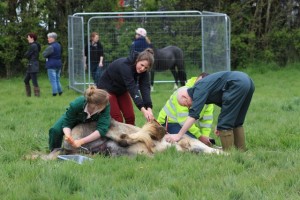BEVA Trust Vets Support Horse Charity Projects

Vets castrate a young colt while the next candidate awaits his turn’. Hig resolution version available on request.
The BEVA Trust joined up with the BHS and SPANA this month to pilot two separate projects to help horse welfare at home and abroad. Seven veterinary volunteers assisted with a UK-based equine castration and microchipping day organised by the BHS, while in Morocco two volunteers provided valuable teaching support for SPANA’s veterinary teams.
The BEVA Trust is the British Equine Veterinary Association’s philanthropic arm and was established almost 50 years ago. Historically the bulk of its expenditure was small grants relating to travel and education but following a review last year the Trust’s focus has changed. BEVA members expressed a desire for the Trust to focus on voluntary veterinary participation in charitable welfare projects. The two pilot projects were very well subscribed with more than 40 vets volunteering their services for the limited places available.
Seven volunteer vets worked non-stop on the pilot castration and microchipping project in Hampshire earlier this month. BHS welfare officers identified local horses that needed gelding and/or microchipping and arranged the logistics for the day. Then vets gelded 28 colts and stallions and microchipped and issued passports for a total of 45 horses over the course of the day.
The initiative was an important trial run for further clinics proposed over the coming year. The scheme aims to educate owners, establish links with the veterinary profession, reduce accidental breeding and help with identification and traceability of horses. The BHS estimates that by holding 12 successful castration clinics they could prevent the birth of thousands of foals over the next two generations. In addition, working with horse owners to passport and microchip their horses will increase the number of horses being correctly identified. Not only will this help to protect the food chain but it will also improve the traceability of fly-grazed and abandoned horses.
Martin Peaty of The Barn Equine Surgery in Hampshire was one of the volunteer vets. He said: “Unplanned and unwanted pregnancies contribute to an oversupply of foals and eventually unwanted horses, which is a major welfare issue. In addition colts and stallions are more difficult to look after and find good homes for. It was great to be involved with like-minded colleagues in this project to help take positive action to tackle these problems.”
Lee Hackett, Director of Policy at the British Horse Society (BHS), continued: “Thanks to BEVA Trust vets our castration and microchipping project is set to make a real difference to Britain’s equine over-population problem, which is the root cause of the majority of the welfare problems we encounter.”
The second BEVA Trust project saw two vets flying out to Casablanca in Morocco to help provide teaching at SPANA’s Annual Congress. SPANA’s vets work in the field, often in challenging conditions with limited availability of expensive tools or medicines. Chris Pearce, who runs the Equine Dental Clinic in Dorset, lectured on dentistry. Caroline George of Lambourn Equine Vets taught wound management using lectures and a practical workshop.
Chris Pearce said: “We met vets from Mauritania, Ethiopia, Mali, Tunisia, Jordan and Zimbabwe as well as from Morocco – such lovely people and all trying to help the working equids of Africa. Thanks to SPANA and to BEVA Trust for their initiative and invitation – I wish I could have stayed longer.”
Jeremy Hulme, chief executive of SPANA, said: “We’re very grateful for the assistance given by BEVA Trust – and to Chris and Caroline for their fantastic contributions. We were delighted that they were able to share their knowledge, expertise and skills with our vets at our CPD event, improving their knowledge and skills to ensure that horses, donkeys and other working animals in some of the world’s poorest countries receive the high quality veterinary treatment they so desperately need.”
Julian Samuelson, Chairman of the BEVA Trust Committee said: “We are encouraged by the very positive response by BEVA members to the call for volunteers. BEVA will review the success of these pilot projects and consider continuing and expanding its support of this type of pro bono initiative.”
To find out more keep an eye on www.beva.org.uk.











